A Complete Guide to Old Dog's Eyes Turning White: Everything You Need to Know!
Ever wondered why your old dog’s eyes are going white?
It’s not just about age — there’s more to it than that!
Find out the common causes of cloudy eyes in senior dogs and how to keep their vision sharp and healthy.
Don’t wait — learn what you need to know to save their sight!
Disclaimer: This article is intended for informational purposes only and does not constitute medical advice. Always consult your veterinarian for diagnosis and treatment of any health concerns regarding your pet.
Introduction
Have you noticed your senior dog’s bright eyes going a little cloudy or white?

It’s like their eyes are getting foggy and you’re not sure why.
Some cloudiness can be part of your dog’s aging process or even a sign that your dog develop cataracts, but you need to know when it’s something more serious that needs attention.
In this post, we’ll cover what makes your old dog’s eyes go white, what you can do about it, and how to keep those puppy eyes shining through their golden years!
After all, keeping your elderly dog’s vision clear can make their senior years as bright as their younger days.
Why are the Old Dog’s Eyes Turning White?
As your dog gets older, you may notice their eyes going white or cloudy.

This is a sign of aging, often caused by lenticular sclerosis, a natural hardening of the lens that occurs as dogs age. It looks scary but lenticular sclerosis doesn’t usually affect vision too much.
But cloudy eyes can also be a sign of more serious conditions like cataracts or corneal ulcers.
Cataracts can block light from getting to the retina and cause loss of vision in your dogs' eyes.
So you need to know the difference between normal aging and a more serious problem.
Natural Aging or Health Problem? How to Tell the Difference?
Not all white or cloudy spots in your dog’s eye are a cause for panic.
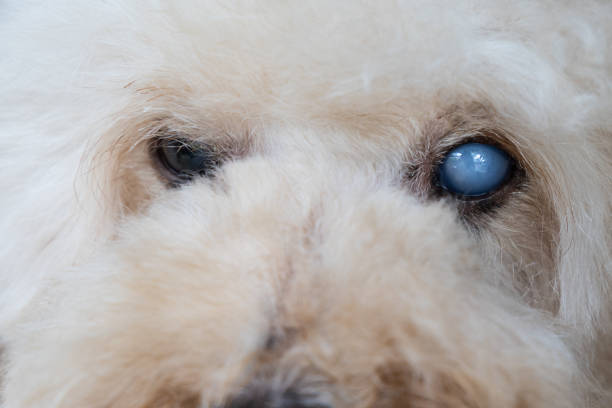
As dogs age some cloudiness is expected due to lenticular sclerosis which doesn’t usually affect their vision. This is mostly harmless to your senior dog.
But if your dog’s cloudiness comes with other symptoms—like excessive tearing, rubbing at their eyes, or difficulty seeing in low light—there might be a bigger problem like cataracts or an eye infection.
Always consult a veterinary ophthalmologist to be sure.
Common Causes of Cloudy Eyes in Senior Dogs

- Lenticular Sclerosis: A natural aging process where the lens hardens and becomes cloudy and blueish. Common in most dogs but usually doesn’t cause blindness.
- Cataracts: A more serious condition that clouds the lens completely blocks light and causes significant vision loss as it affects your elderly dog's optic nerve; showing a cloudy appearance.
Lenticular Sclerosis: What is it?
Lenticular sclerosis is like the eye’s version of grey hair. The lens gets denser as dogs age and becomes cloudy. It’s not painful and doesn’t usually affect your dog's eye.
Cataracts: When to Worry?
Unlike lenticular sclerosis, cataracts can cause vision problems because they block light from reaching the optic nerve.
Cataracts can develop slowly over time by showing a cloudy appearance but in some cases can progress quickly and cause blindness if not treated.
Signs of Cloudy Eyes in Dogs
You may see the cloudiness in your dog’s eyes but there are often other signs that something is wrong.
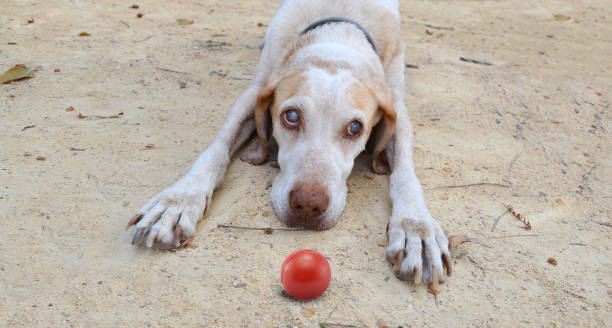
Some things to look out for are the following:
- Excessive tearing or discharge
- Squinting or avoiding bright light
- Rubbing or pawing at the eyes
- Bumping into objects
These signs can be a sign of corneal ulcers, glaucoma, or cataracts all of which need a veterinary ophthalmologist to treat your dog's lens, such as cataract formation, cloudy eye, eye injury, and other corneal diseases.
Can Cloudy Eyes Cause Vision Loss?

In some cases, cloudy eyes can cause vision impairment especially if left untreated, and could worsen to a painful condition that may affect blood vessels through your dog's cornea.
Conditions like cataracts or corneal ulcers can block light from entering the eye and cause vision loss over time.
Lenticular sclerosis doesn’t usually cause blindness. But keep an eye out for changes in your dog’s behavior as vision problems can be a sign of a more serious problem like cataracts.
Corneal Dystrophy in Dogs
Corneal dystrophy is another condition that causes a dog’s cloudy eyes.
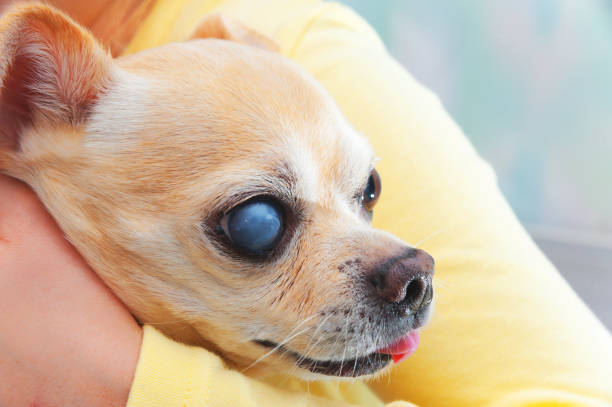
This genetic disease affects the cornea the clear outer layer of the eye and can cause cloudiness on the surface of the eye.
Types of Corneal Dystrophy
There are three types of corneal dystrophy:
- Epithelial Corneal Dystrophy: Affects the outer layer of the cornea.
- Stromal Corneal Dystrophy: Occurs in the middle layer and usually appears as white or grey deposits.
- Endothelial Corneal Dystrophy: Affects the innermost layer of the cornea and can cause swelling and in severe cases discomfort.
Corneal Ulcer in Senior Dogs
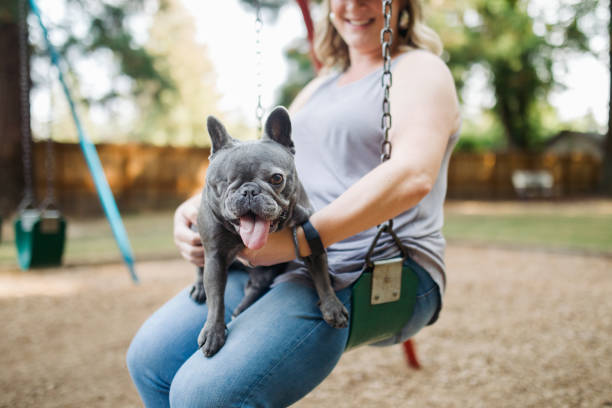
A corneal ulcer is a painful open sore that can form on the surface of the eye. They are often caused by trauma, infections or conditions like dry eye.
What Causes Corneal Ulcers?
- Injury or trauma to the eye
- Dry eye (lack of tear production)
- Infections (bacterial, viral or fungal)
Corneal ulcers need immediate veterinary attention as untreated ulcers can get worse and cause permanent vision loss.
How to Take Care of Your Senior Dog’s Eye Health
Taking care of your dog’s eyes as they age can prevent or slow down some conditions.
Here's how:
- Regular Veterinary Ophthalmologists Check-Ups: Your dog’s vet can monitor for early signs of problems like cataracts or corneal ulcers.
- Eye Drops: For conditions like dry eye prescribed eye drops can help keep the eyes moist and reduce irritation. However, too much fluid can be bad for your dog's health as well. In such cases, visiting your veterinary ophthalmologists can be helpful.
Healthy Eye Habits
- Keep your dog’s retina clean and free of discharge.
- Feed your dog a diet rich in vitamins that support eye health.
- Look out for signs of vision problems like bumping into things or squinting.
Diagnosing Cloudy Eyes in Older Dogs

When you take your dog to the vet they will likely perform several tests to determine the underlying cause of the cloudiness.
Here are some of the tests they may use:
- Schirmer Tear Test: Used to check for dry eye by measuring tear glands and production.
- Fluorescein Stain Test: This will highlight any damage to the cornea like scratches or ulcers.
Treatment for Cloudy Eyes in Dogs
Treatment will depend on the cause of your dog’s cloudy eyes.
For conditions like corneal ulcers or dry eye, the vet may prescribe eye drops or oral medication to manage the symptoms and prevent further damage.
In more severe cases like advanced dog's cataracts, your vet may recommend surgery to restore vision.
Can Surgery Fix Your Dog’s Vision?
If your dog has cataracts that are affecting their vision, surgery is usually the way to go.
Cataract surgery involves removing the cloudy lens and replacing it with an artificial one so light can enter the retina again.
Genetics and Eye Problems: Are Some Breeds More Prone?
Some dog breeds are genetically predisposed to eye problems like cataracts or corneal dystrophy. Boston Terriers, Cocker Spaniels, and Poodles are more likely to inherit hereditary cataracts.
Knowing your dog’s genetic risk can help you be proactive about their eye health.
How Often Should Senior Dogs Have Eye Exams?
Eye exams are essential for senior dogs especially if they already have vision loss or cloudy eyes.
Your vet can catch conditions like cataracts early and recommend treatment before it gets worse.
How to Prevent Cloudy Eyes in Dogs?
You can’t prevent age-related changes to your dog's eye like lenticular sclerosis, or dog's cloudy eyes but can reduce the risk of other eye conditions.
- Keep your dog’s eyes clean.
- Get regular check-ups.
- Use eye drops if your dog has dry eye.
Conclusion
As your furry companion ages, it’s normal for their eyes to show signs of wear and tear. But don’t panic—cloudy eyes aren’t a vision death sentence.
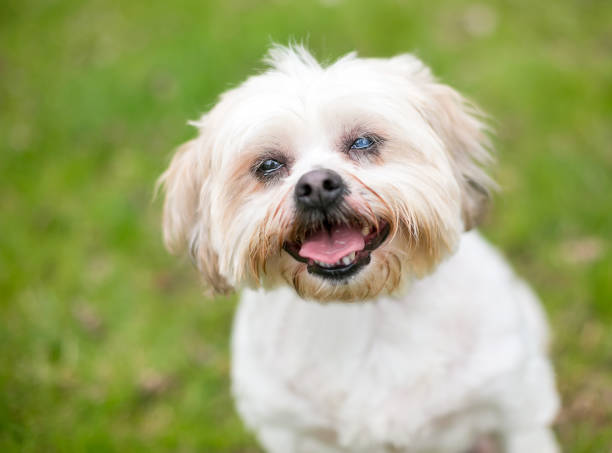
Regular vet visits, good eye care and a keen eye on changes can help your dog's eye have a happy, healthy life even if their vision gets a little fuzzy.
Knowing what to look out for from cataracts to lenticular sclerosis will help you stay ahead of the game.
So, give your elderly dog the gift of good eye health—because they see the world as clearly as they see you!
FAQs
1. Is Cloudy Eyes Normal in Older Dogs?
Yes, lenticular sclerosis is a normal part of aging that causes a bit of cloudiness in the eyes but doesn’t affect vision.
2. Can Cataracts Cause Blindness in Dogs?
Yes, if left untreated cataracts can cause vision loss or blindness.
3. Can Eye Drops Help Cloudy Eyes?
For dry eyes or mild infections, eye drops can be very effective in keeping your dog’s eyes healthy.
4. Are Some Dog Breeds More Prone to Cloudy Eyes?
Yes, breeds like Cocker Spaniels, Boston Terriers, and Miniature Schnauzers are more prone to eye problems.
5. How Can I Prevent My Dog’s Eyes From Going Cloudy?
Regular vet visits, balanced diet and keep your dog’s eyes clean.




